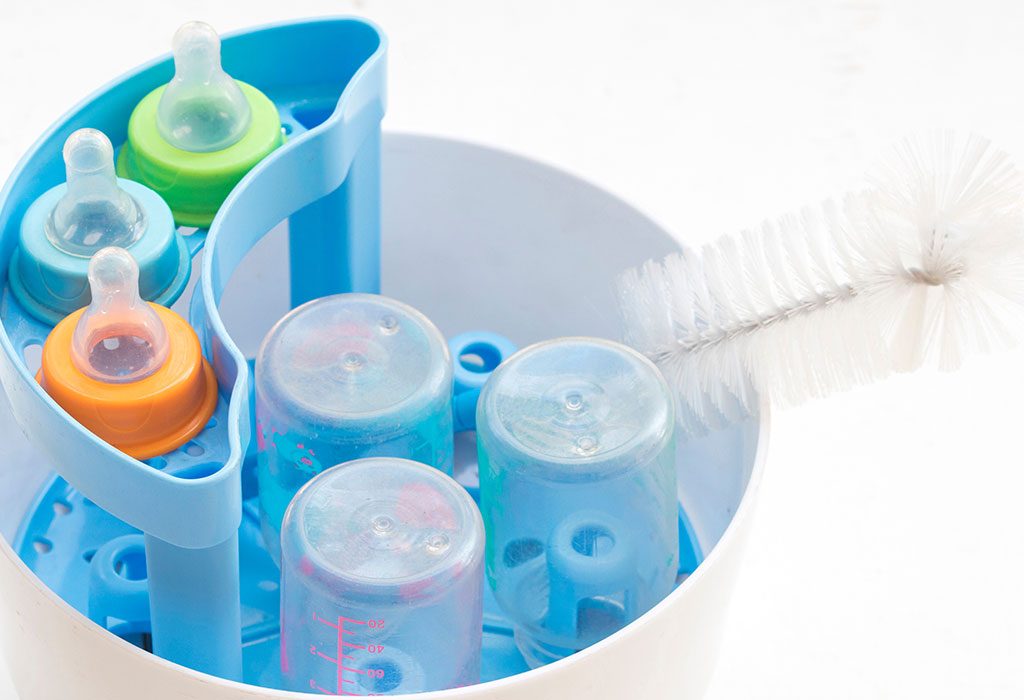Bottle feeding is different from breastfeeding in that the baby is fed from a bottle. Either breast milk or formula milk can be bottle-fed.
What Are the Pros of Bottle Feeding?
The upsides of bottle feeding are:
1. Anyone can feed the baby.
One of the benefits of bottle feeding is that either parent can feed the baby. Feeding is an important bonding moment; breastfeeding doesn’t give the daddy an opportunity to bond with the baby. Bottle feeding allows the siblings, father and other family members to spend some time with the newborn baby.

2. It can be done in public.
For some moms, breastfeeding in public can be embarrassing. If you don’t want to expose your breasts or go to a private area for breastfeeding, bottle feeding is the way to go!

3. Keeping a track of your baby’s intake is easy.
It isn’t easy to know how much milk your baby is drinking when you breastfeed. Bottle feeding helps you find out your baby’s daily milk intake.
4. You don’t have to worry if your breast milk supply is low.
Many moms worry that their baby will remain underfed if their breast milk supply is insufficient. In such a case, parents can resort to bottle feeding. This ensures that your baby gets all the milk he needs to grow and develop.
5. You don’t have to worry about making changes to your diet.
A mother who feeds formula milk to her baby doesn’t have to worry about adding specific fruits and veggies to her diet. She can eat and drink anything she likes.
6. Bottle feeding helps babies who have lactose intolerance.
In rare cases, infants cannot process breast milk or animal milk. This situation is known as lactose intolerance. Then, suitable formula milk, such as soy protein, can be fed from a bottle.
7. The mother’s health condition doesn’t affect the baby
If the mother falls ill after childbirth or faces health issues that don’t let breastfeed,a bottle can be used to feed the baby.
What Are the Cons of Bottle Feeding?
The disadvantages of bottle feeding are:
1. Breast milk is more nutritious.
Breast milk has all the nutrients that your baby requires to grow and develop. It is also light on the stomach than formula milk. Bottle feeding may increase the risk of obesity in early childhood.
2. Prepare the milk for bottle feeding takes time and effort.
You can breastfeed your baby on demand. But if you’ve habituated your baby to bottle feeding, you need to wash and sterilise the bottle, pour milk into the bottle and warm it. It’s a lot of work! Improper sterilisation can also your infant’s health at risk.

3. Bottle feeding equipment are an added expense.
You’ll need to buy feeding bottles, a cleaning brush and also a steriliser. You’ll also have to invest in a good-quality breast pump or formula milk powder. This is an added expense to your monthly budget.
4. Bottle feeding may compromise your baby’s immune system.
Studies show that breast milk develops and improves your baby’s immune system. Formula milk, on the other hand, doesn’t contain vital and natural nutrients. Formula-fed babies also carry the risk of developing certain illnesses like chest infection, ear infection, urine infection or diarrhoea.
5. It affects the mother-baby bonding.
Feeding is a bonding moment for the mother and the child. When she latches on to your breasts, skin-to-skin contact is established. Bottle feeding may hamper this bonding.
6. Bottle feeding is inconvenient.
You’ll have to carry clean bottles, formula milk, baby nipples, and other necessities while travelling. It can be troublesome to manage the things as well as the baby at the same time. Bottle feeding is also inconvenient if your baby requires midnight feeding sessions as you have to get up and prepare the milk each time.
7. Breastfeeding keeps the mother healthy.
Some studies have proved that moms who choose to breastfeed rather than bottle feed reduce their chances of suffering from breast cancer, ovarian cancer and osteoporosis.
8. Your baby may not take to formula milk.
For some babies, formula milk fed from a bottle may not be suitable. They may experience diarrhoea and a loss of fluids from the body.
9. Bottle feeding puts your baby at the risk of SIDS.
Studies have shown that breastfeeding can help to prevent babies from Sudden Infant Death Syndrome (SIDS).
Bottle feeding has its own pros and cons. You should carefully consider both sides of the situation before settling on the method of feeding your baby. The aim is to ensure that your baby is neither underfed nor overfed and gets the essential vitamins and nutrients while she adapts to the world around her.









